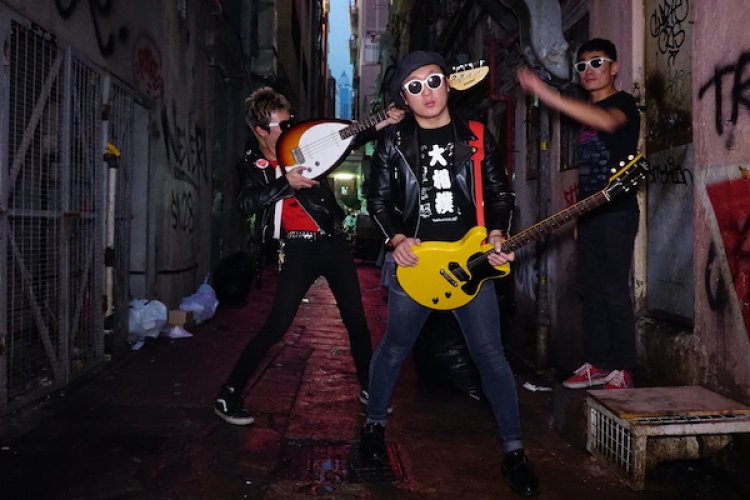World AIDS Day: What You Can Do to Help
Since 1998, Chi Heng Foundation (CHF) has provided basic sponsorship (art and music therapy programs, summer camp and entrepreneurial training) for over AIDS-affected 13,000 children, and the organization is now in the process of expanding its social enterprises. In observance of today being World AIDS Day, we asked CHF’s founder and chairperson, Chung To, to break down the myths of this stigmatized epidemic.
Who is eligible for CHF funding?
We have very clear-cut criteria: Their parents are either living with HIV or have died of AIDS. We are not a poverty-relief program, nor a region-specific program. But we do end up supporting more kids in poorer villages simply because the parents who have to sell blood were usually poor to begin with.
What are some common misconceptions about HIV/AIDS?
That HIV and AIDS are the same thing. In Chinese, they use the same word, which makes them even harder to distinguish. Another thing: Many people think that if you get HIV, you’ve been dealt a death sentence. In truth, with the advancements of medicine, the life span of people living with HIV can be prolonged substantially. When properly treated, HIV can become a long-term chronic illness like diabetes or hepatitis. Currently we have HIV-positive students in college and in medical school, who have gotten married and formed families.
What challenges do AIDS-affected children typically face?
The most basic is education – the Chinese government only provides support up to the ninth grade. It’s very explicitly stated that even children living with AIDS will not get senior high or university sponsorship, so a lot of them grow up uneducated simply because they don’t have the money. Therefore, even if there was no stigma to face, they’d still be at a disadvantage in the job market in the long run.
Second is the psychosocial impact. They often suffer a lot of discrimination from schoolmates, neighbors and sometimes even their own relatives. If not properly handled, many of them grow up with a great deal of hatred of society. If they can’t get a job, if they continually get frustrated, there will also be a higher percentage of them who turn to crime. If you look at the mafia, you’ll find they prefer to recruit orphans for that same reason. There’s a higher percentage with other marginalized populations as well.
How does CHF seek to prevent those problems?
The fact remains that if you’re part of a minority, you’re more likely to go to the extreme on account of the lack of acceptance. We have some students who know their parents are poor and AIDS-affected, but will work doubly hard because they’re aware of their minority status – they have a strong desire to achieve and change their destiny. We want to mobilize more people to think that way. But at the same time, we have seen people give up and constantly ask, "Why is the world so unfair to me?" By definition they don’t receive the same love and care from their parents, so they have a looser moral system. They can’t distinguish between right and wrong.
The key goal is to give these children hope. I’ve done countless home visits. At first a lot of them couldn’t look at me, they kept their heads down. When I would ask them about college, they’d say, "I’m not good enough for college." Our first step is to help them regain their self-esteem and think, "Oh yes, I can do that."
If you grow up in a depressing environment where people constantly tell you you’re dumb, that you can’t go to college, that your parents are poor and have AIDS – if that has been so internalized, then nothing is possible no matter what we give them. That’s why we organize regular trips to visit the city. We want them to meet other AIDS orphans in college and see that higher education is a possibility for them as well. We need to make them feel that even despite their unfortunate background, they should still work hard to change their own destiny.
A lot of people think that just giving them money and an education will solve the problem. But no, it’s the change in mentality, the eye-opening experience, that is most important. CHF is only 10 years old, yet we have already helped 1,000 university students, many of whom have great jobs and are not afraid to tell others that they’re from AIDS families. But it takes time.
Tell us three things about CHF that we wouldn’t find on your website.
#1: We are doing more than just providing an education and psychosocial support for the orphans. We are empowering a group of stigmatized and underprivileged children to be proud of themselves – to not allow themselves to be victims, but to become changemakers who are in charge of their own destinies. We teach them skills so they can make an income. In fact, 18 of our paid staff were the AIDS orphans who we used to support; that makes up almost half of our 44-person workforce. It’s very touching to see these orphans transform from being people we once helped to people who are able to help others. The success of our program really depends on the children themselves. We never asked them to give us anything in return, but the fact that they want to come back and work for us shows that we’ve also taught them to be socially responsible. It shows that during the time we helped them financially, they received more than just monetary support – they also received a lot of love. One of our students once said, “Well, HIV took away my parents, but because of HIV I also got a bigger family.”
#2: Our mission is not only to help AIDS orphans, but to generate awareness about the HIV/AIDS issues and mobilize more people to do charitable work. Many of our volunteers and corporate partners have never done anything related to HIV/AIDS. Most existing charity models are based on donations, but we want our contributors to do more than just give money. We not only want to mobilize them to help, but also their children. In fact, many of our volunteers are actually children of the donors. We are trying to foster a culture of social responsibility.
#3: We are trying to make the whole model sustainable. We now run a lot of social enterprises. Hopefully that will give us, the organization, a sustainable income as well. We are trying to transform the economic situations in these AIDS-affected villages. I think the core program of our work – the education sponsorship – is itself sustainable. We cannot feed these children for the rest of their lives. By giving them an education we giving them a future, and hope.
CHF hosts regular trips to AIDS-affected villages and is always looking for more volunteers. Visit www. www.chihengfoundation.com for more information.
Photos: Chi Heng Foundation






